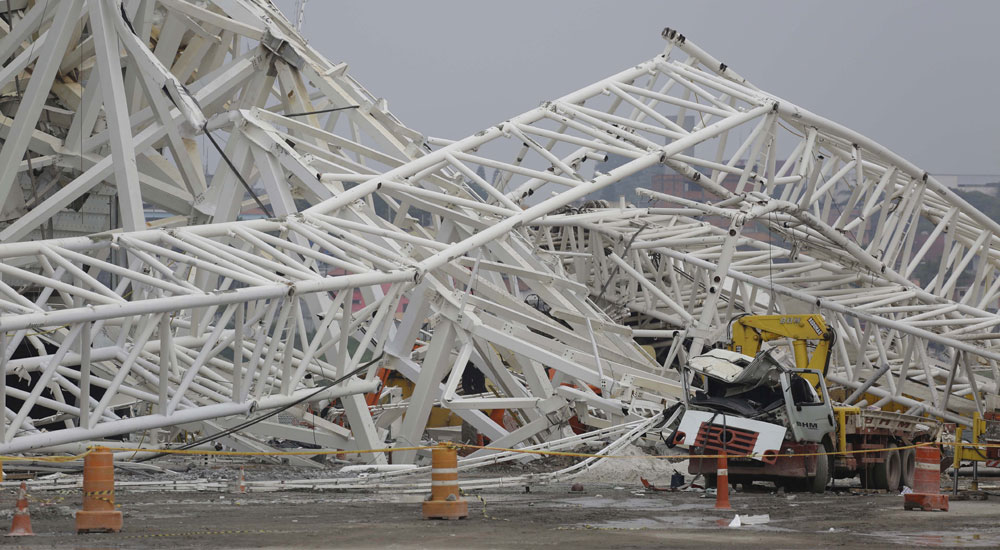
A collapsed metal structure sits on the ground at Itaquerao Stadium in Sao Paulo, Brazil, Wednesday, Nov. 27, 2013. The accident that resulted in the death of at least two workers, occurred when a construction crane crashed into a 500-ton metal structure that in turn cut through the outer walls of the venue, destroying rows of seats and slamming into a massive LED panel that runs across the stadium’s facade. The stadium is slated to host the 2014 World Cup opener. AP
SAO PAULO – Two workers were killed Wednesday when a crane collapsed at a stadium set to host next year’s World Cup opener, raising fresh doubts about Brazil’s ability to finish work for the tournament on schedule.
Andres Sanchez, operations director at the Arena Corinthians site, said the workers, aged 44 and 42, were crushed to death when a crane hoisting a 500-ton metallic piece to the top of the roof collapsed.
He said the cause of the accident was not yet known but was under investigation.
He insisted that the overall structure was not affected.
The accident came amid a scramble to meet a December 31 set by football’s governing body FIFA to complete work at the venue.
A third worker was rushed to hospital with injuries after the accident, which brought a shocked response from FIFA president Sepp Blatter and condolences from the Brazilian ministry of sport.
“I’m deeply saddened by the tragic death of workers @Corinthians arena today,” Blatter said on Twitter. “Our heartfealt condolences are with the families.”
Work on the site has been suspended for three days of mourning until next Monday, after which 30 percent of the site will be closed to assist the investigation.
Jair Paca de Lima, the civil defense coordinator, said the accident might have been caused by “an error in the operation of the crane or by the weight of the structure which was being lifted.”
But construction giant Odebrecht, which is in charge of the project, said the crane was operated properly.
“The crane is capable of lifting three times the weight” of the structure, said Frederico Barbosa, the operations manager at the site.
FIFA, which has faced recent scrutiny over worker conditions at under-construction venues for the 2022 World Cup in Qatar, later said safety standards for workers were “a top priority.”
Arena Corinthians is one of 12 World Cup venues planned for the tournament, for which Brazil has been struggling to overhaul its creaking infrastructure.
In addition to the opening of the Cup, the stadium will host five other games, including the semi-final, while the final will be played in Rio’s iconic Maracana stadium next July 13.
The reported $11 billion cost of staging the event has aroused public protests.
One site worker, Jose Mario da Silva, 48, told the G1 news portal the accident happened as most workers were having a lunch break.
“I had walked underneath this structure to go and have lunch. If it had happened at a different moment, many more people could have died — I could have died myself.”
Da Silva added that the accident occurred as “a crane was lifting the last and heaviest piece of the stadium roof.”
FIFA’s secretary general Jerome Valcke also expressed his shock and sadness in a tweet.
“Extremely shocked by the news from Sao Paulo,” Valcke said. “Our thoughts are with the families of the victims of this accident. We are currently awaiting further details from the authorities, who are investigating this tragic accident.”
“The safety of workers is the top priority for FIFA, the LOC (the Cup’s Local Organizing Committee) and the federal government,” FIFA said in a statement. “We know the safety of all workers has always been paramount for all the construction companies contracted to build the 12 FIFA World Cup stadiums.”
FIFA set a strict December 31 deadline for completing all 12 host venues amid fears Brazil will struggle to be totally ready.
Earlier this month, Odebrecht said the Corinthians arena was 94 percent complete, with the roof’s steel structure already mounted and the pitch laid.
About 1,500 employees are currently working around the clock to ensure the 68,000-seat stadium is finished on time.
Wednesday’s accident is not the first to hit preparations.
Work was temporarily suspended in the southern city of Curitiba after a labor court ruled that there were various safety breaches and a “serious risk of workers being buried, run over and of collision,” as well as being hit by construction material.
In June 2012, a construction worker was killed in a fall at the new stadium in Brasilia and, last March, another worker fell to his death at the Amazonia Arena in Manaus.